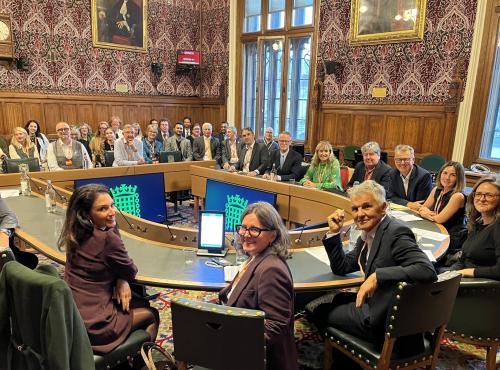A “War-fighting Ready” Workforce? Tackling UK Defence Skills Shortages in the 2025 Strategic Defence Review (SDR)
The UK’s 2025 Strategic Defence Review (SDR) places skills and workforce capability at the core of defence reform, acknowledging a growing crisis in recruitment and technical expertise across the Armed Forces, Civil Service, and defence industry. This reflects longstanding concerns from Policy Connect and others about persistent shortages in engineering, digital, and manufacturing roles that threaten national security and industrial competitiveness (see Policy Connect’s 2023 Upskilling Industry report). The SDR sets ambitious targets and workforce recommendations, but there remain concerns about the Government’s commitment to funding increased defence spending (particularly, as delivering the SDR’s recommendations would require defence spending of 3/3.5% of GDP, and therefore likely tax increases) and delivering effective skills strategies that ensure the UK’s future war-fighting readiness.
Skills at the Heart of the Strategic Defence Review
Launched in July 2024 by the newly elected Labour government – and released on 2 June 2025 – the Strategic Defence Review (SDR) marks a comprehensive overhaul of UK defence policy aimed at “securing Britain at home and projecting strength abroad”. Commissioned by Prime Minister Keir Starmer on 16 July 2024 – and overseen by Defence Secretary John Healey and the MOD, the review was led by a trio of independent external experts – Lord Robertson, Dr Fiona Hill, and General Sir Richard Barrons – to ensure credibility and cross-sector input. While independently authored, the review’s 63 recommendations have been fully endorsed by the government, signalling a strong political commitment to its plan for the next decade and beyond in UK defence.
The SDR highlights a worsening “workforce crisis” marked by recruitment and retention challenges. UK Regular Armed Forces numbers have declined by 8% since 2022, and skills shortages now affect military, civil service, and industrial roles, particularly in manufacturing, engineering, and advanced technologies. The Review makes clear that this is not just a staffing issue but a strategic constraint on the UK’s operational capability.
Section 4.3, titled “One Defence,” focuses on people, training, and education, emphasising that skills are foundational to defence effectiveness. It calls for agility in developing capabilities in digital, cyber, AI, leadership, and financial management. The MOD is tasked with adopting a whole-force, skills-based approach, boosting Reserve numbers by 20%, and establishing career education pathways across all workforce segments by 2026. These priorities closely align with Policy Connect’s Skills 2030 and upcoming Skills in the Age of AI reports, which call for a long-term, cross-sector digital and technical skills strategy.
The Review also promotes stronger collaboration between the MOD, Department for Education (DfE), Department for Science, Innovation and Technology (DSIT), and universities to build a pipeline of STEM talent. Initiatives such as secondments, outreach, and a 30% expansion of Cadet Forces with a renewed focus on STEM are designed to raise awareness and engagement. Policy Connect has long advocated for better integration between education and industry, making this a welcome step toward a more joined-up national skills strategy.
Additional proposals include modernising defence education infrastructure, granting more operational freedom to institutions like the Defence Academy, and developing a cross-departmental plan to boost industrial productivity – particularly in nuclear and maritime sectors. The Review asserts that defence capability depends not just on equipment or doctrine, but on the adaptability, skills, and inclusivity of the workforce. Section 4.3 outlines seven specific recommendations related to workforce planning, education, and leadership, with other skills-related recommendations dispersed throughout the document.
DfE and Skills England’s Coordinated Response
On the same day as the SDR release, the Department for Education’s Skills England body published its Defence Sector Skills Needs Assessment. The report recognises defence as a cornerstone of both national security and economic growth, supporting over 239,000 jobs. It highlights the government’s intention to increase defence spending to 2.5% of GDP by 2027, with a long-term goal of reaching 3%. However, it warns that spending alone is not enough – the sector must also be underpinned by a future-ready workforce.
Skills England identifies significant gaps in craft roles (such as welders and electricians), specialist roles (such as nuclear engineers and naval architects), and emerging fields (like digital, cyber, and green technologies). These shortages are exacerbated by an ageing and male-dominated workforce, with limited gender and ethnic diversity. Employers cite barriers such as outdated training standards, slow qualification reform, and poor awareness of defence career pathways.
To tackle these challenges, Skills England advocates for more flexible training models, extended Skills Bootcamps, modular course offerings, and broader recognition of alternative qualifications such as T Levels. It also emphasizes the need for stronger collaboration between government, education providers, and industry to develop a resilient and future-ready talent pipeline. Key initiatives – such as the Centres for Doctoral Training and the Defence Industrial Joint Council – are identified as vital mechanisms for aligning workforce development with the UK’s defence strategy. Furthermore, Skills England’s 2 June commitment to an annual, data-driven skills assessment is a key step toward evidence-based workforce planning and offers a framework to evaluate training initiatives over time.
A Sector at a Crossroads
With the momentum generated by the SDR and Skills England assessment, the UK has a renewed opportunity to address the long-standing defence skills gap that has limited national capability. Policy Connect and industry experts have long warned about the risks of inaction, as the sector continues to grapple with persistent challenges: outdated perceptions, delays in security clearance, and geographic constraints that hinder the recruitment of diverse talent. Women and ethnic minority groups remain significantly underrepresented.
There is broad consensus on the way forward: investment in modern training infrastructure, reforming apprenticeship opportunities, greater inclusivity, and sustained funding – especially in high-tech and nuclear sectors. The SDR outlines a bold vision, and the government’s endorsement of its recommendations is a welcome step. But momentum must now be matched by action. Real progress will require coordinated leadership, effective implementation, and ongoing scrutiny to deliver lasting change.
Conclusion
The UK’s defence skills crisis is not new, but the 2025 SDR and Skills England’s assessment mark a pivotal moment of recognition and opportunity. Success hinges on transforming bold ambitions into practical, sustained interventions that modernise training, foster diversity, and build resilient talent pipelines across the sector. Without decisive, collaborative effort, the risk remains that critical skills shortages will undermine the UK’s war-fighting readiness and long-term security. Policymakers and industry must now move beyond frameworks and recommendations to deliver real, measurable progress – ensuring the UK has the skilled workforce needed to meet future defence challenges.



